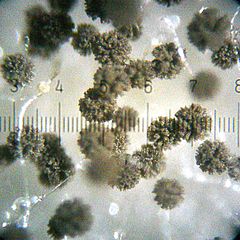Ask Our Experts: When and how does mold grow in a building?
December 1, 2014 | 1:00 pm
Question for Our Experts:
When and how does mold grow in my home or office?
Our Experts’ Answer:
The Short Answer
Mold is a type of fungi that can potentially present health hazards to building occupants. There are five prerequisites that must be present in order for mold growth to occur. It’s important to effectively control these five prerequisites (particularly moisture) in order to effectively prevent mold growth. If mold growth is occurring in your home or office, it’s important to address it right away, either via residential grade cleaning products or via professional mold remediation services (as appropriate).
The Detailed Answer
This question can be broken down into a couple smaller components:
- What are the prerequisites for mold growth to occur, and can I control them in such a way as to prevent mold from appearing? In short, there are five primary requirements for mold growth: moisture, a food or nutrient source, the proper temperature, a starter spore, and time. When all five of these elements are present in a home, office, or other building, you’ve got the “perfect storm” brewing for mold growth! Of these five elements, moisture is the most controllable aspect. Thus, it’s important to maintain a home or office building with appropriate levels of humidity throughout the year. Additionally, it’s critical to immediately address any water damage that might occur at your home or office – don’t let that leaky roof or damp basement stay that way for long!
- What is mold, and is it normal? Does it mean that my home is dirty or something is wrong with my home if there’s mold in it? “Fungi” is the umbrella category for molds, mildew, mushrooms, yeast, rusts, and smuts. It’s important to realize that fungi are present everywhere in our environment. “Normal fungal ecology” is the term used for the typical levels of fungal material present indoors, given appropriate consideration to the building structure and environment. When fungi are present in elevated, concentrated levels and / or when certain types of molds are present that produce harmful toxins to humans, a variety of health risks can be present. If you can visibly see mold growing in your home or office, it should be addressed.
- Is it possible to clean mold on my own, and are there any risks in “self-diagnosing” mold? There are a number of residential grade cleaning products that address minor issues of common household mold. However, if there is ever a situation where water damage has occurred (e.g. roof leak, plumbing issues, flooding) or where mold is growing or spreading (particularly beyond an area of 10 square feet), an industry professional should be consulted. For more on the process of cleaning mold, see our related blog entry, “When do I need a professional to clean up mold?”
The Bottom Line
Don’t mess with mold. If in doubt, call a professional mold remediation expert, like those at Tuckey Restoration. And if you’re not currently dealing with mold in your home or office, be sure to avoid the “perfect storm” for mold growth by controlling the five prerequisites for mold growth – especially moisture.
For professional assistance with this and other restoration or HVAC work, Tuckey is the local expert to call. Keep our number handy – you never know when you might need us! Call (717) 524-1198 or visit www.tuckey.com for more information.
Some information is adapted from Fungal Contamination: A Comprehensive Guide for Remediation, 2nd Ed., Michael Pinto, Wonder Makers Environmental.
Photo by Bob Blaylock at en.wikipedia [CC-BY-SA-3.0 (https://creativecommons.org/licenses/by-sa/3.0) or GFDL (https://www.gnu.org/copyleft/fdl.html)], via Wikimedia Commons
All material Copyrighted (c) by the Tuckey Companies, 2025.


